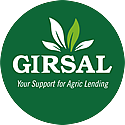GIRSAL Ltd, in collaboration with the National Banking College, will begin the 7th cohort of the Agriculture and Agribusiness Lending Course for Staff of Financial Institutions on 9th August 2022. Three cohorts of the training program have been planned this year with funding support from Development Bank, Ghana (DBG).
The course is designed to enhance the capacity of staff of financial institutions to effectively assess agricultural loan applications and structure and manage agribusiness loans to reduce the issue of non-performing loans. The course also helps improve their knowledge and understanding of the agriculture sector and its value chains, opportunities, and risks.
The Development Bank of Ghana (DBG) and GIRSAL Ltd are co-funding the training program, which is being delivered at no cost to participants. The National Banking College will deliver the training course with technical assistance support and supervision from GIRSAL.
The 2022 sessions of the course will focus on Modules 1 and 2 covering Ghana’s agribusiness environment, value chains, agriculture insurance, and agricultural loan appraisal techniques. The two modules target agriculture desk officers, relationship managers, credit risk officers, and credit analysts within financial institutions. The course also includes a practical field visit.
Upon completing the two modules, training participants are awarded a recognized certification from the National Banking College and GIRSAL.
The principal of the National Banking College, Madam Gloria Darline Quartey, and the Director of Studies and Training, Dr. Stephen Antwi, on Wednesday 27th July renewed the agreement between the two institutions by signing a memorandum of understanding at GIRSAL’s office premises.
Background
GIRSAL’s Agriculture and Agribusiness Lending Training Course for Financial Institutions was jointly developed and rolled out in collaboration with the National Banking College in 2020, funded through a grant from Alliance for Green Revolution in Africa (AGRA). Six (6) cohorts (of 3 modules each) were successfully delivered to a total of 262 mid-level staff from 24 financial institutions (mainly universal banks) between August and September 2021. Selected modules from the training program were also successfully tested with selected rural and community banks
An impact assessment conducted at the end of the sixth cohort indicated that the training was effective in demystifying the agriculture sector and the prevailing perception that the agriculture sector is “high risk.” Also, participants from FIs that are currently engaged in agribusiness lending found the training to be highly relevant. They reported that the training allowed them to put what they had been doing in perspective and bring on a fresher and more informed attitude to their roles.

